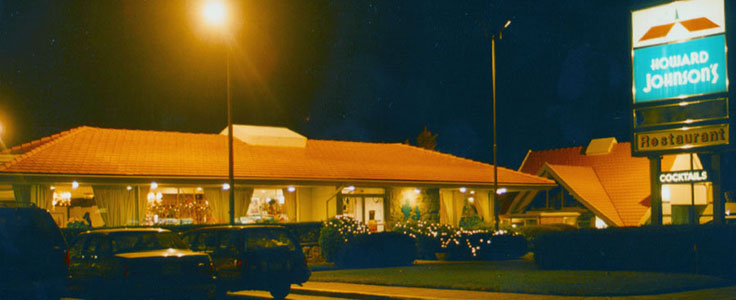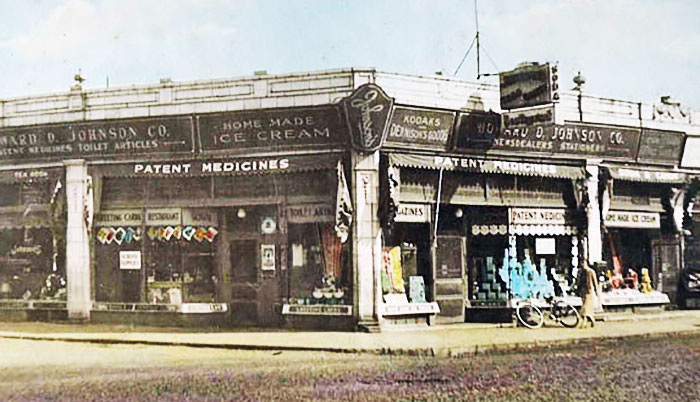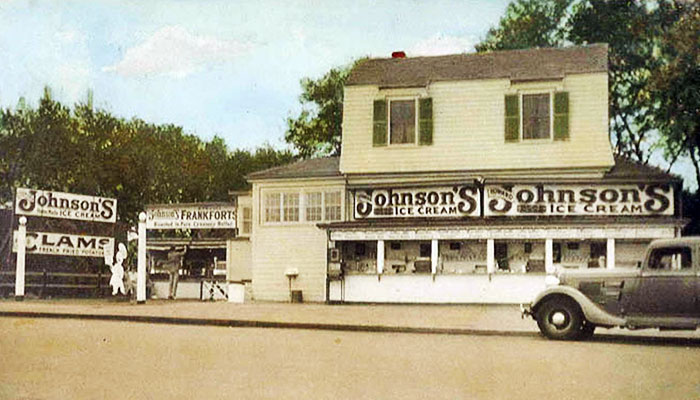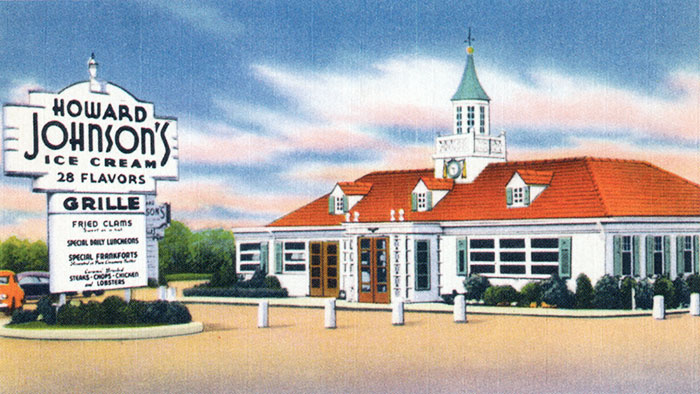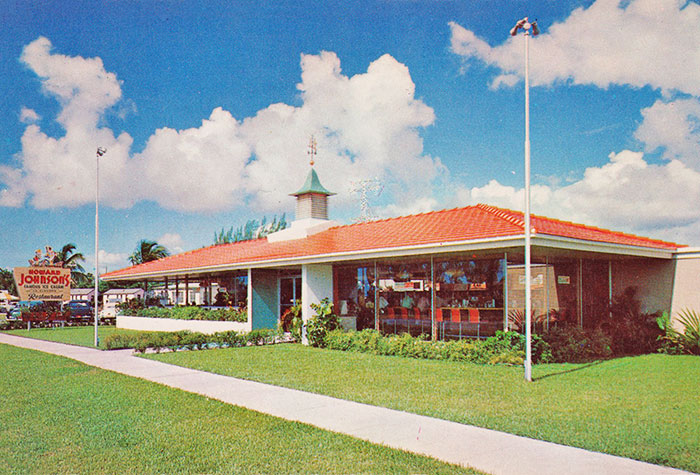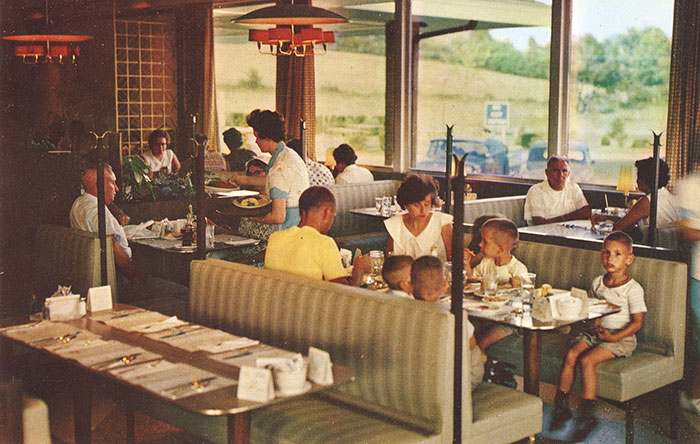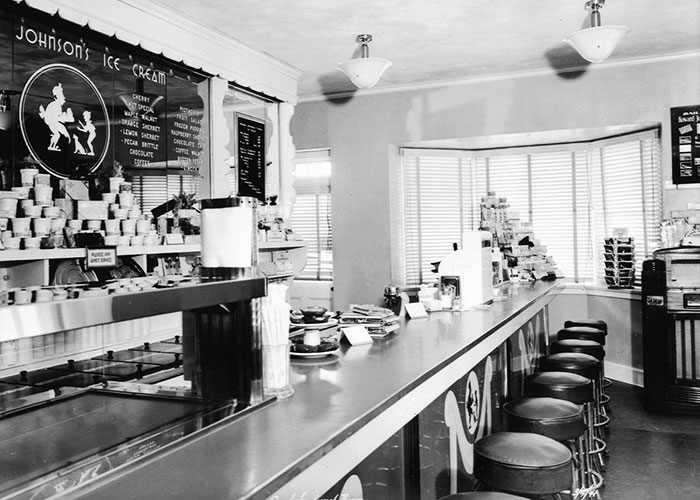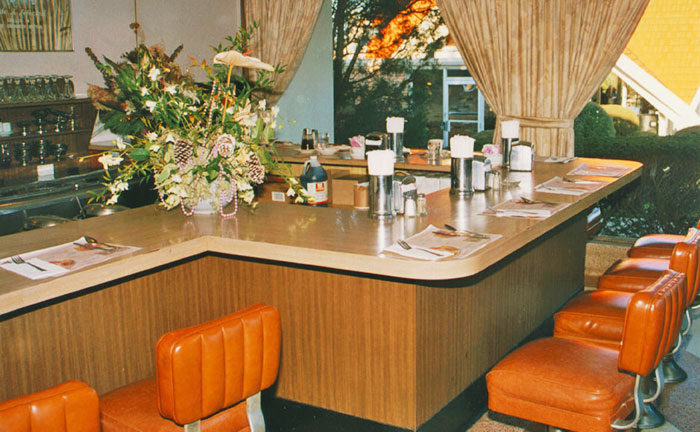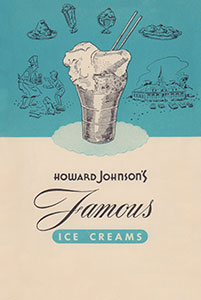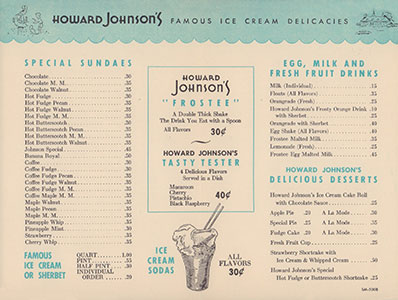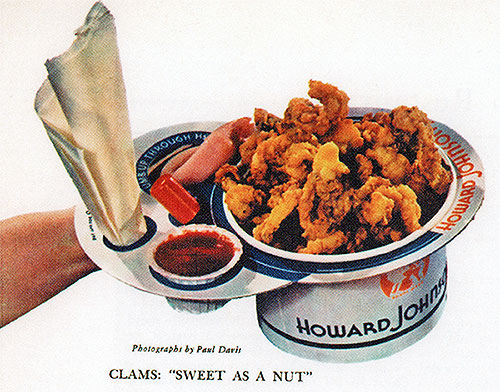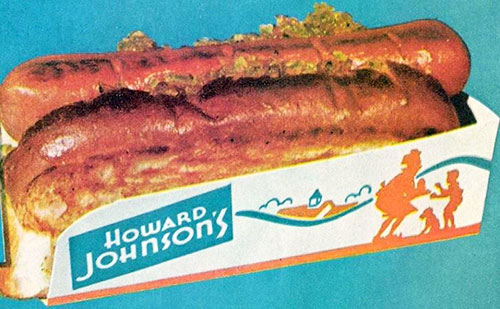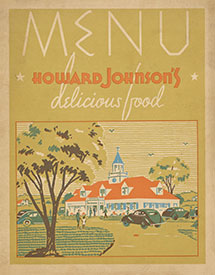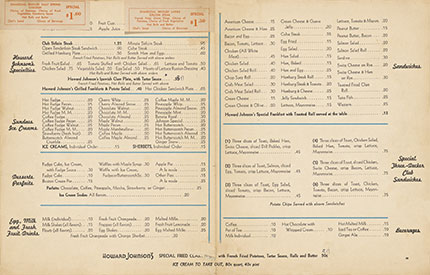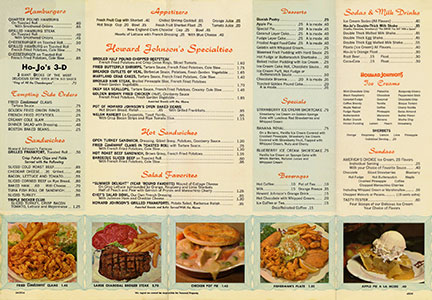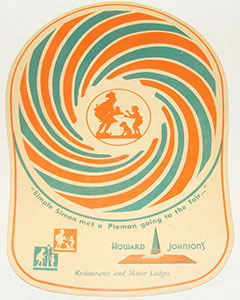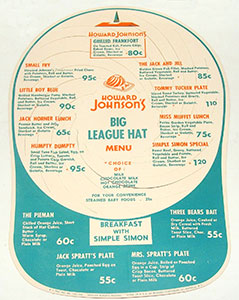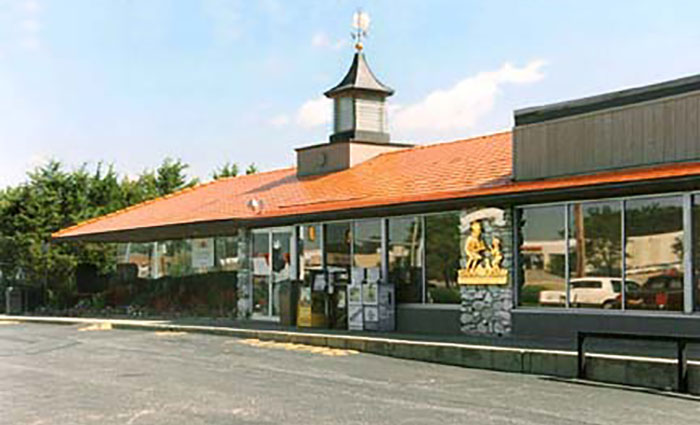|
Howard Johnson's Howard Deering Johnson was born on February 2, 1897 in Dorchester, Massachusetts and moved with his family to Quincy, Massachusetts in 1899. He left school in the eighth grade to work for his father, who owned a small cigar store and manufacturing company. After serving in World War I, Johnson returned to Quincy and in 1925 borrowed $2500 to purchase a small drugstore at 89 Beale Street. He sold newspapers, magazines and cigars, and had a marble soda fountain with three flavors of ice cream — vanilla, chocolate and strawberry.
To ensure his drugstore would be a
success, Johnson developed an ice cream recipe with double the
butterfat.
His rich, creamy ice cream was flavored with all-natural ingredients and the
quality and taste never varied. He formulated twenty-eight flavors
and was quoted as saying, "I
thought I had every flavor in the world."
Throughout the summers of the late 1920s,
Johnson opened concession stands on beachfront property along the
coast of Massachusetts. The first was opened in 1926 on Wollaston
Beach, where he paid $300 for the privilege of selling ice cream
from a twenty-two foot stand. He sold $60,000 worth of ice cream
cones that summer — 14,000 cones on one Sunday.
In 1929, Johnson opened a sit-down restaurant in Quincy Square's Granite Trust Building. He served traditional New England foods, including roast turkey, steaks and chops, chicken pot pies, baked macaroni and cheese, baked beans and, of course, twenty-eight flavors of ice cream.
In the summer of 1935, the first franchised
Howard Johnson's restaurant opened on Cape Cod. By the fall of 1940,
Johnson had more than 130 restaurants throughout New England in
one-story white colonial-style buildings, with dormered orange
porcelain tile roofs, turquoise blue shutters and a cupola with a
Simple Simon and the Pieman weathervane — all with standardized
menus and ice cream dishes.
Maintaining consistent quality at each Howard Johnson’s location was made possible by an enormous commissary system of centralized kitchens, which produced, froze and distributed much of the food to individual restaurants. Franchisees strictly adhered to the minutely detailed preparations laid out in the Howard Johnson's Bible. By 1953, there were 353 Howard Johnson's restaurants, all east of the Mississippi. In the spring of 1954, the first Howard Johnson's west of the Mississippi opened in Missouri — at 10460 St Charles Rock Road in St. Ann. Over the next two years, three more Howard Johnson restaurants opened in the St. Louis area — at 7950 Clayton Road in Richmond Heights, at 1130 South Kirkwood Road in Kirkwood, and at 6935 South Lindbergh in Mehlville. And by the end of the decade there were restaurants at 8609 Watson in Webster Groves and 3501 North Kingshighway in North St. Louis.
The new restaurants all had a more contemporary
design, which would become the standard for Howard Johnson's
restaurants and their most famous and
recognizable design. The restaurants were sleek single-story
structures, surrounded by large plate-glass windows. There was a
sloping orange tile hip roof, topped with the trademark cupola and Simple
Simon weathervane.
Inside the new restaurants, rustic traditional
seating was replaced with minimalist benches; Formica tabletops replaced wood
tables. There were terrazzo floors, acoustic ceilings, birch trim and
pink tinted mirrors.
A Formica counter with orange stools was
usually to the right as one entered a Howard Johnson's restaurant. A
customer could have a quick snack, a cup of coffee or a dish of ice
cream here rather than a full meal in the main dining room, usually to
the left. A mirrored backboard displayed the Simple Simon and the Pieman
logo, plus the twenty-eight flavors of ice cream.
The twenty-eight flavors of ice cream that
Howard Johnson settled on became the backbone of his business. In
1949, he sold more than 3 million gallons, 85% of which were
vanilla, chocolate or strawberry. The list remained constant at
twenty-eight, with each new promising concoction replacing a failing
flavor.
There were also four fruit-flavored sherbets
offered — orange, raspberry, lime and lemon. However, it wasn't just twenty-eight flavors of ice cream that brought customers back to Howard Johnson's. It was also their delicious fried clams, touted as being "sweet as a nut" and native to New England.
In 1951, Howard Johnson's introduced the "clam
strip" to the public. Clams were shucked and their large digging
muscles removed. They were then cut into thin strips and fried.
Since they were fried without their bellies, the sweet flavor was
more appealing to a larger customer base. They were trademarked as "Tendersweet" clams.
Clam chowder was also a mainstay on the Howard Johnson's menu. Jacques Pepin, a young French chef, was hired by Johnson to work in New York, testing recipes to be used throughout the country. Pepin perfected the clam chowder, which was made from the discarded bellies in the fried clams preparation. The chowder was made in 3,000-gallon quantities.
Another popular menu item was Howard Johnson's
grilled "frankfort." All-beef frankfurters were clipped at both
ends, notched lengthwise and grilled in creamery butter. They were then placed in a butter-toasted roll and
served in a paper sleeve.
In the 1960s, four
additional Howard Johnson's restaurants opened in the greater St.
Louis area — at 9085 Dunn Road in Hazelwood, 9301 Lewis & Clark in
Jennings, 611 North Lindbergh in Creve Coeur and 1425 South Fifth
Street in St. Charles. Two more restaurants opened in the 1970s at 5915 Wilson in Midtown St. Louis and 12322 Dorsett Road in
Maryland Heights.
Howard Johnson's
was among the first
family-friendly restaurants, offering special menus for children
with meals such as the Peter Piper Plate, the Humpty Dumpty Lunch and the Simple Simon
Special. Menus were designed as baseball caps, the Easter Bunny and Santa Clause. There was also an Ice Cream Game which offered a free ice
cream cone once all twenty-eight flavors of ice cream had been
ordered and twenty-eight boxes checked. By the late 1970s, while there were more than 1000 Howard Johnson's restaurants throughout the country, fast food chains like McDonald’s had begun to devour market share with inexpensive menus. The Howard Johnson's in Webster Groves had become a Steak 'n Shake by 1972. The restaurant on North Kinshighway had closed in 1973 and would become a Kentucky Fried Chicken. In 1976, the Howard Johnson's on Lindbergh in Creve Coeur was purchased by Port St. Louis owner Wade DeWoskin and converted to Wade's, a Gathering Place. It would later become a KC Masterpiece BBQ location. The Maryland Heights Howard Johnson's became Roma's in 1980. The St. Charles Rock Road location in St. Ann would close in 1981 and become a Shoney's. The South Lindbergh restaurant in Mehlville became Victoria's Ice Creamery in 1984. In 1984, Harry Giessow, who owned both the Howard Johnson's in Kirkwood and the restaurant on Clayton Road in Richmond Heights, converted the Clayton Road location to Layton's. In 1987, the Howard Johnson's on Dunn Road in Hazelwood became a Dohack's, the midtown location off of Hampton became a Marriott, the restaurant in St. Charles became a Ramada Inn and the Jennings location was liquidated. * * * * * By April of 2002, there were less than 20 Howard Johnson's restaurants remaining in the United States and only one west of the Mississippi — the orange-roofed restaurant in Kirkwood. The Hoard Johnson's at 1130 South Kirkwood Road was built by Harry Giessow in 1955. His son, Gary Giessow, later became the owner and operator for many years. By 2002, the restaurant was owned by Michael Van Stavern. The restaurant's general manager was working on a concept to keep the old favorites on the menu — the fried clams and the frankforts — and combine them with more contemporary cuisine. "Our goal is to be around for a long time," he said. "We want to bring the restaurant into the 2000s. We hope to keep our older clientele while bringing in younger people." On October 21, 2002, the Kirkwood Howard Johnson's closed without fanfare. "We just ran of of food," said Van Stavern.
Outside, Simple Simon and the Pieman still
twirled atop the weathervane on the cupola. The chain's logo also
graced a stone wall. But the eraser board that had advertised daily
specials read: "Out of Business."
The last Howard Johnson's restaurant on the planet closed its doors in the sleepy resort town of Lake George, New York in 2017.
Copyright © 2020 LostTables.com |

